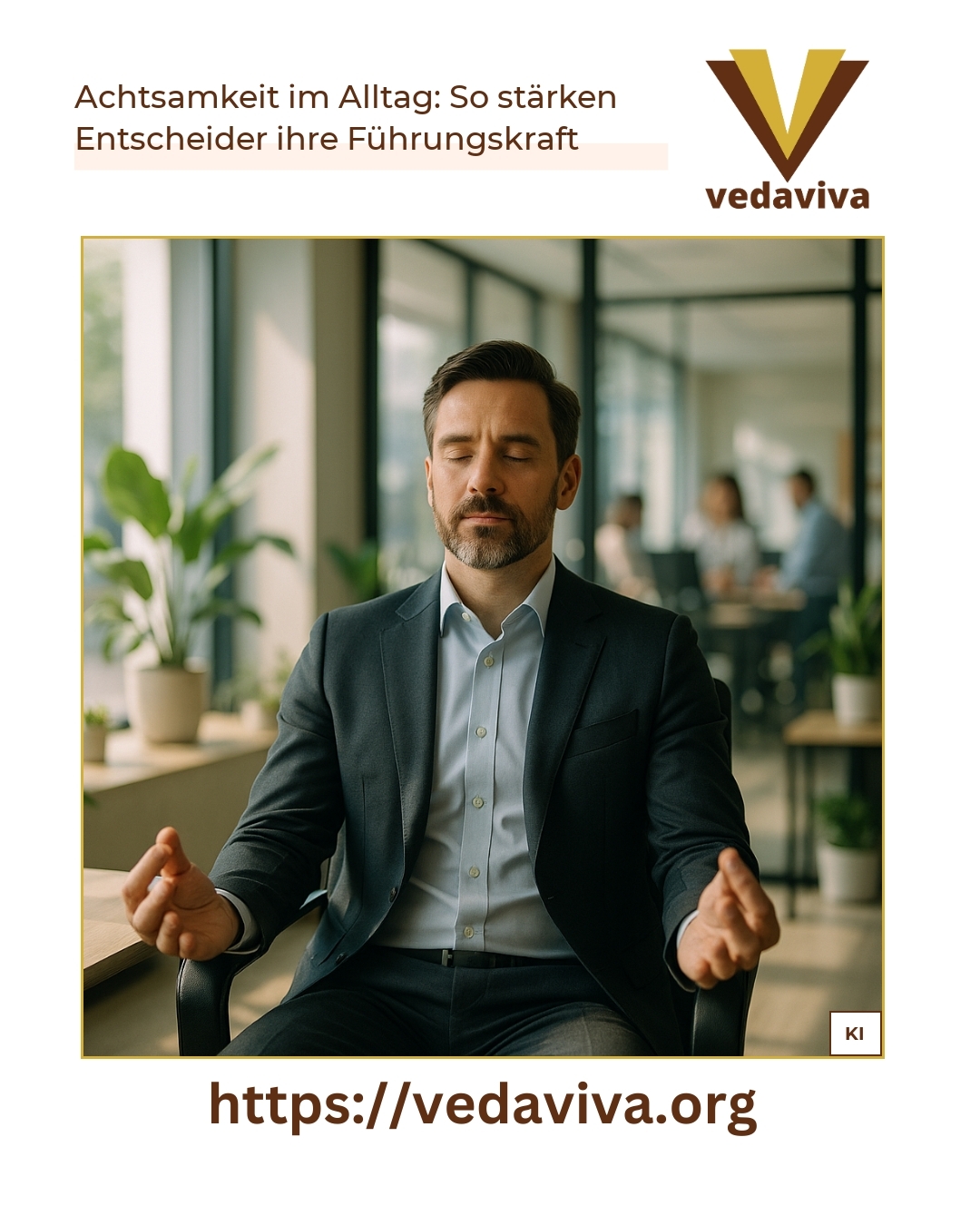Mindfulness in everyday life: How decision-makers strengthen their leadership skills
In today's working world, managers are often exposed to high levels of stress. Deadlines, decisions and diverse demands can quickly lead to excessive demands and stress. Mindfulness in everyday life offers a valuable opportunity to face these challenges more calmly and strengthen managers in the long term. It is about being more aware of the moment, recognising your own thoughts and feelings and thus acting in a more targeted manner.
Self-reflection through mindfulness in everyday life
Self-reflection is one of the central elements of mindful leadership. Decision-makers use this approach to better understand their own behaviour, emotions and thought patterns. This conscious introspection enables managers to rethink their decisions in a targeted manner and develop effective long-term strategies.
For example, a manager can recognise when they are reacting too impulsively or when fears are influencing decision-making. This knowledge helps to make more conscious and clearer decisions in the next step.
BEST PRACTICE at company XYZ (name changed due to NDA contract) One manager integrated short periods of self-reflection into her daily routine in order to better understand inner patterns and thus approach conflict situations more calmly. This approach improved her confidence and led to more relaxed teamwork.
Presence in the moment as the key to clear leadership
Mindfulness in everyday life helps you to stay present in the moment. Being present means focussing fully on the current situation without being overwhelmed by stress or distractions. This keeps the mind clearer, which is crucial for managers to assess situations realistically and with full attention.
Those who act mindfully in the here and now can also respond more empathetically to employees' concerns. This awareness promotes trust within the team and increases motivation.
BEST PRACTICE at company XYZ (name changed due to NDA contract) One decision-maker introduced regular breathing breaks before meetings in order to increase concentration and to get in the mood for the discussion. This led to a noticeably more focussed atmosphere and better discussion results.
Healthy boundaries through conscious mindfulness in everyday life
It is essential for managers to set boundaries and protect themselves from overload. Mindfulness helps them to recognise their own energy reserves and take breaks in good time. This healthy demarcation maintains performance and reduces the risk of burnout.
Conscious self-care helps managers to support their teams better and more sustainably because they themselves remain more balanced.
BEST PRACTICE at company XYZ (name changed due to NDA contract) One manager used digital mindfulness apps to keep an eye on her stress levels. This enabled her to plan recovery phases in good time and thus avoid overload. This balance not only improved her health, but also her leadership quality.
Clear communication and empathy through mindfulness in everyday life
Mindfulness not only promotes your own inner attitude, but also has a positive effect on communication. Those who listen attentively and choose their words consciously create an open atmosphere for dialogue. Employees feel recognised and are more willing to share ideas and criticism.
Empathy, strengthened by mindfulness, makes it easier to respond to different needs and resolve conflicts constructively.
BEST PRACTICE at company XYZ (name changed due to NDA contract) In a team meeting, one manager practised attentive listening by asking questions and only speaking after everyone had finished speaking. This practice strengthened trust in the team and led to more creative solutions.
Simple exercises for implementing mindfulness in everyday life
Decision-makers can incorporate mindfulness into their everyday lives using simple methods: short breathing exercises, conscious breaks or focussed awareness of their surroundings. Just a few minutes a day are enough to clear your mind and recharge your batteries.
Digital tools such as mindfulness apps or smartwatches can also help to monitor personal stress levels and promote reflection.
BEST PRACTICE at company XYZ (name changed due to NDA contract) One manager introduced three short breaks of around five minutes a day in which she consciously paid attention to her breathing and allowed thoughts to pass by without judgement. This routine increased her resilience and helped her to react more calmly to challenges.
My analysis
Mindfulness in everyday life helps managers to organise their role more effectively and sustainably through self-reflection, presence, healthy boundaries and clear communication. This conscious attitude not only promotes clarity and health, but also has a positive effect on the team climate and cooperation. Through simple exercises and integration into everyday working life, decision-makers can strengthen their leadership in the long term.
Further links from the text above:
[1] Mindfulness in leadership: saying no and acting effectively
[2] Mindfulness in everyday life: a success factor for managers - SAULDIE
[3] Mindfulness in everyday life: How managers make calm decisions
[4] Mindfulness in everyday life: how managers increase their success
[5] Mindfulness in everyday life: the secret to success for managers - SAULDIE
Legal notice: Coaching does not replace therapy. It serves personal development. I do not diagnose or promise a cure. My offer is for personal development and is not a substitute for medical, psychotherapeutic or curative treatment. Please consult a medically qualified specialist if you have any health complaints. The experiences described here are based on individual feedback from my clients. They are not a guarantee of success and do not replace medical or therapeutic counselling. For more information and if you have any questions, please contact Contact us on the topic or read further blog posts on the Topic here.













